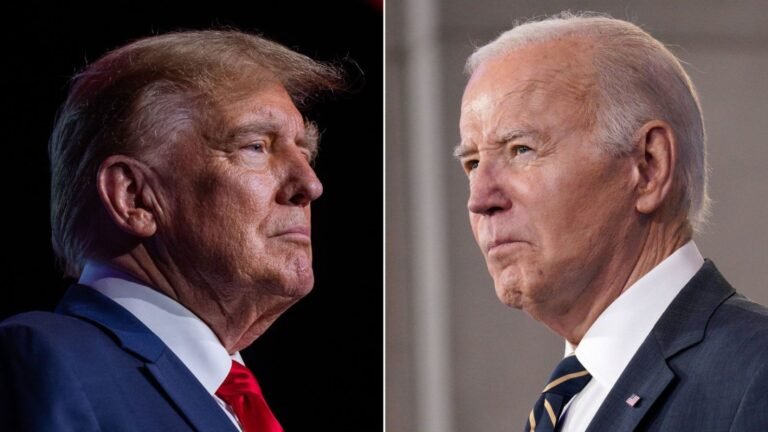The 38-year-old, first-time candidate enters the race largely unknown to the public outside of tech circles but was an early supporter of Kennedy’s presidential bid, backing him last year while he was still running in the Democratic primary.
Shanahan said during her remarks Tuesday she initially “didn’t think much of” Kennedy but became drawn to his campaign after hearing his interviews, which she said gave her “hope for our democracy.”
“I saw a person of intelligence, of compassion, and of reason. … I discovered a person who speaks out on issues that, even though they are critically important to human health and welfare, are consistently ignored by our government, and for the first time in a long time, I felt hope for our democracy,” Shanahan said.
Kennedy’s campaign is hoping Shanahan’s youth and fluency in the tech world’s anti-establishment rhetoric will help him expand and excite his base of support. Though Shanahan has been more cautious in her statements about vaccines than Kennedy, a leading skeptic, she has repeatedly questioned their safety. On Tuesday, Shanahan implicitly made the false suggestion that “pharmaceutical medicines” such as prescriptions and vaccines could be contributing to rising rates of autism in children.
The deep-pocketed investor could also provide a financial boost to backstop Kennedy’s expensive campaign and its attempt to get on the presidential ballot in all 50 states. That effort has been stunted by requirements in certain states that candidates file alongside a running mate.
‘A hard childhood’
An Oakland native, Shanahan was raised by a father diagnosed with bipolar disorder and schizophrenia and a mother who immigrated to the US from China, according to People magazine. Her family relied on welfare growing up and struggled to make ends meet, the publication reported.
“I had a very hard childhood with a lot of sadness, fear, and instability,” Shanahan told People. “At times there was violence.”
She told supporters in Oakland on Tuesday her father was “plagued by substance abuse” and “struggled to keep a job.”
“I think of him when I see the statistics of the millions of Americans who are addicted, depressed or suffering,” she said. “This is one of the epidemics of our time. It affects nearly every American family.”
Shanahan briefly touched on her wealth during her remarks but leaned more strongly into her low-income upbringing in a family that relied on food stamps.
“As you probably know, I became very wealthy later on in life, but my roots in Oakland taught me many things I’ve never forgotten: that the purpose of wealth, is to help those in need,” Shanahan said.
Shanahan, who was previously married to Google co-founder Sergey Brin, told The New York Times last month that she gave $4 million to a pro-Kennedy super PAC to help pay for an ad, which she assisted in producing, that ran during this year’s Super Bowl. The spot repurposed video from the 1960 presidential campaign of Kennedy’s uncle, John F. Kennedy, and drew criticism from several Kennedy family members.
Before aligning with Robert F. Kennedy Jr., Shanahan contributed to Democratic campaigns. She gave $25,000 to President Joe Biden’s joint fundraising committee in 2020, according to federal campaign finance records, and labeled herself “a lifelong Democrat” in an interview with Newsweek earlier this year.
On Tuesday, she formally declared she’s “leaving the Democratic Party” and said Democrats have “lost their way.” She said she would take “the best ideals and impulses” of the party with her into the Kennedy campaign.
‘Not an anti-vaxxer’
Shanahan has previously said she supports Kennedy, 70, in part because of his environmental advocacy and for his stance on vaccines and children’s health.
“I do wonder about vaccine injuries,” she told The Times. While stressing that she is “not an anti-vaxxer,” Shanahan said, “There needs to be a space to have these conversations.” In the interview with Newsweek, she characterized Kennedy’s false claims about vaccines as an effort to raise awareness about “vaccine safety” while again pushing back on the label “anti-vaxxer.”
“Framing Bobby as an anti-vaxxer is the most powerful way of alienating the progressive voter from his campaign. What he’s highlighting is vaccine safety,” she told the publication.
Kennedy is among the most prominent vaccine skeptics in the country and, through his role as the head of Children’s Health Defense, has helped spread falsehoods about vaccines, including the claim that they can lead to “injuries.”
Shanahan told Newsweek that she received a Moderna Covid-19 vaccine and a booster and that her daughter with Brin, Echo, has received all her regularly scheduled vaccines. She also told the magazine that she suffered from “significant health issues” since receiving her Covid vaccine.
“I don’t know if they’re related,” she said, “but I’d like to know.”
Shanahan is the founder and president of the Bia-Echo Foundation, which is focused on “reproductive longevity & equality, criminal justice reform, and a healthy and livable planet,” according to the organization’s website. Shanahan told People magazine last year that part of her group’s work is focused on finding a cure for autism.
On Tuesday, Shanahan spoke about her and Kennedy’s shared goal of eradicating chronic disease.
“I got into it through my journey of reproductive health followed by a steep learning curve for caring for my daughter, who has an autism diagnosis,” she said.
“Pharmaceutical medicine has its place, but no single safety study can assess the cumulative impact of one prescription on top of another prescription, and one shot on top of another shot on top of another shot throughout childhood. We just don’t do that study right now, and we ought to,” she added.
In the public eye
Shanahan and Brin were divorced last year. In 2022, The Wall Street Journal reported that Shanahan had an affair with Elon Musk, prompting Shanahan and Brin to separate. Shanahan denied having an affair with Musk in an interview with People magazine last year. Musk denied the affair in a social media post shortly after the Wall Street Journal story published in 2022.
In an essay published in People last year, Shanahan said the Wall Street Journal story had “been a disaster” affecting her career and personal life.
“I can’t think of anything worse for a professional woman’s career than publicly shaming her for a sexual act,” she wrote. “Worst yet, throw in infidelity. Worst yet, throw in two wealthy and famous men.”
Shanahan graduated with a degree in Asian studies, economics, and Mandarin Chinese from the University of Puget Sound in Washington state, according to her LinkedIn profile, before earning her law degree from Santa Clara University in the Bay Area.
She is a CodeX fellow at Stanford Law School’s Center for Legal Informatics.














